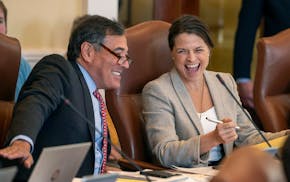WASHINGTON – Six years into his presidency, President Obama is sending Congress a budget that does not herald a partisan legislative showdown. There's no push to overhaul health care as he did in 2009, no drive as in 2010 to restrict Wall Street, no attempt to increase taxes as in 2011 and 2012, no move to halt automatic spending cuts as in 2013.
Politically speaking, this is a peacetime budget in an election year, when the most meaningful fights will take place during congressional campaigns, not in Congress.
As such, Obama's budget, to be released Tuesday, will offer a template for political messaging.
This will not be an austerity budget. Last year, Obama proposed reducing annual increases in federal benefit programs, a step many Democrats found difficult to fathom. The cut was part of the president's offer to the GOP for a long-term attack on the debt, through a mix of major tax hikes and spending reductions.
But that approach failed. Now, with deficits declining and weariness over default threats and government shutdowns, neither side appears willing to play that game of brinkmanship again.
Instead, Obama's blueprint for the budget year that begins Oct. 1 proposes $56 billion in spending above the caps agreed to in a bipartisan deal from earlier this year. The extra spending would not add to the deficit because Obama proposes to pay for it with a mix of program cuts and elimination of tax breaks.
It proposes to bring in more revenue through stricter tax rules for U.S. firms that have operations overseas and for foreign businesses with divisions in the United States. Those new rules, requiring congressional action, would tackle what the administration considers tax avoidance schemes.
Both the spending and tax proposals are long shots for legislative action this election year. But they are part of a unifying theme for Democrats eager to distinguish themselves from Republicans.
Obama, speaking to the Democratic National Committee on Friday, cast his budget proposals as part of a larger message of opportunity for all.
"Next week, I will send Congress a budget that will create new jobs in manufacturing and energy and innovation and infrastructure. And we'll pay for every dime of it by cutting unnecessary spending, closing wasteful tax loopholes," he said.
A day earlier, House Speaker John Boehner had offered the GOP message, citing the economy and Obama's health care law as defining issues. "His budget apparently will make no effort to address the drivers of our debt and our deficit," he added. That probably will be a central GOP message on Wednesday.

